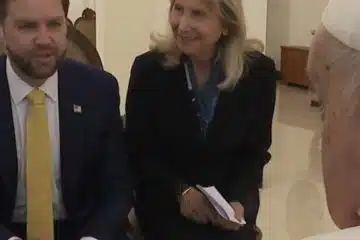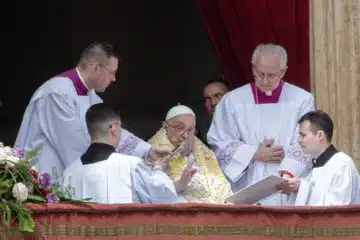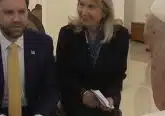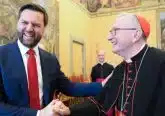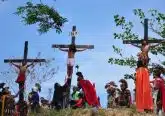Talk to new bishops does not change guidelines on abuse, Vatican says

IMAGE: CNS/photo Alessandro Di Meo, EPA
By Carol Glatz
VATICAN CITY (CNS) — A talk given to new bishops during a Vatican-sponsored course does not represent new guidelines on the church’s response to abuse against minors by religious, a Vatican spokesman said.
A 44-page report authored by French Msgr. Tony Anatrella and just published by the Vatican publishing house “is not in any way — as someone erroneously interpreted — a new Vatican document or a new instruction or new guidelines for bishops,” Jesuit Father Federico Lombardi said in a written statement released late Feb. 11.
The talk was part of a conference of experts given in September and was “published together with other (talks) on different subjects,” Father Lombardi wrote.
Msgr. Anatrella’s talk addressed emotional maturity and deviant behaviors in the priesthood as well as church procedures for dealing with accusations of the abuse of children by clergy.
The monsignor, a psychoanalyst and a consultant to the pontifical councils for the family and for health care ministry, “does not say anything new or different from what has been said up until now by relevant church institutions,” Father Lombardi said.
The Vatican recently released the speeches, homilies and reflections from last year’s course in a book, “Witnesses of the Risen One.” The texts were published only in the original language in which they were delivered. Since 2001, all newly ordained bishops serving in dioceses that report to the Congregation for Bishops have been obliged to come to Rome in September for an eight- or nine-day course for new bishops.
Some media outlets reported that Msgr. Anatrella’s talk, written in French, said bishops are not obligated to report accusations of abuse to authorities.
The Vatican’s Congregation for the Doctrine of the Faith mandated in a 2011 letter that in every nation and region, bishops should have clear and coordinated procedures for protecting children, assisting victims of abuse, dealing with accused priests, training clergy and cooperating with civil authorities.
Describing sexual abuse of minors as “a crime prosecuted by civil law,” the doctrinal congregation said bishops should follow local laws that require reporting cases of sexual abuse to police. Not all countries mandate the reporting of abuse cases to police, however.
The Pontifical Commission for the Protection of Minors reaffirmed that beyond the mandates of civil law, all members of the church “have a moral and ethical responsibility to report suspected abuse to the civil authorities who are charged with protecting our society.”
U.S. Cardinal Sean P. O’Malley of Boston, president of papal commission, issued the written statement Feb. 15, quoting Pope Francis, who said Sept. 27 that “the crimes and sins of the sexual abuse of children must not be kept secret for any longer. I pledge the zealous vigilance of the church to protect children and the promise of accountability for all.”
Cardinal O’Malley reiterated the commission’s willingness to provide educational resources not only to new bishops during their annual course in Rome, but also to all offices at the Vatican “for their use in their own child protection efforts.”
The U.S. bishops’ “Charter for the Protection of Children and Young People” — first adopted in 2002 and revised in 2005 and 2011 — outlined how the church leaders would provide a safe environment for children and young people in church-sponsored activities. It established uniform procedures for handling sex-abuse allegations and adopted a “zero tolerance” policy. It also required background checks and training in child protection for church employees and required dioceses facing allegations made about priests or other church workers to alert authorities, conduct an investigation and remove the accused person from duty.
Newly appointed bishops in the United States also receive two training sessions, which “clearly and explicitly” underline the obligation to report suspected abuse to public authorities, Cardinal O’Malley said in the papal commission’s written statement.
Last June, Pope Francis also approved new procedures for the Vatican’s doctrinal office to investigate and judge claims of “abuse of office” by bishops who allegedly failed to protect minors and vulnerable adults from sex abuse.
In the portion of his talk on a bishop’s responsibility concerning abuse accusations against one of his priests, Msgr. Anatrella reiterated directives requiring bishops to open a canonical investigation as soon as possible into alleged abuses in order to “establish the truth of the facts.”
After spelling out mandated church procedures concerning such crimes, he also underlined the church’s call to bishops to follow local laws.
The monsignor said that in countries where reporting was mandatory, it was “not necessarily up to” the bishop to report to civil authorities as soon as he has learned of an accusation, but up to the alleged victim and/or the family.
Nevertheless, the monsignor wrote, the bishop always possesses “the faculty” of reporting “in good conscience” the abuse if necessary to civil authorities based on how serious the situation is.
Given the new powers of the Vatican’s doctrinal office to investigate and penalize bishops for failing to protect minors, the monsignor added that bishops have to be able to prove they acted upon learning of alleged abuse, investigated allegations and sanctioned those found guilty according to church laws.
“The bishops must be able to prove that he has tried something without being lax in order to neutralize the acts of the abuser” with canonical procedures, he wrote. The bishop will be disciplined — not because of how the investigation turned out — but for a failure to act to protect victims from assault by someone under his authority, he wrote.
In an interview Feb. 12 with the French news agency iMedia, Msgr. Anatrella said: “For the church, it is obvious that there must be cooperation between church tribunals and police and judicial authorities” concerning the crime of abuse.
He also clarified his remark about the obligation falling first to victims and families — not necessarily bishops — to report abuse in countries where reporting is mandatory.
“I said in this paragraph that the bishop or his representative will first encourage the minor-victim and his or her family to file a complaint with the police. If they do not, then it is up to the church authority to make a report,” he told the news agency.
– – –
Copyright © 2016 Catholic News Service/U.S. Conference of Catholic Bishops. www.catholicnews.com. All rights reserved. Republishing or redistributing of CNS content, including by framing or similar means without prior permission, is prohibited. You may link to stories on our public site. This copy is for your personal, non-commercial use only. To request permission for republishing or redistributing of CNS content, please contact permissions at [email protected].


